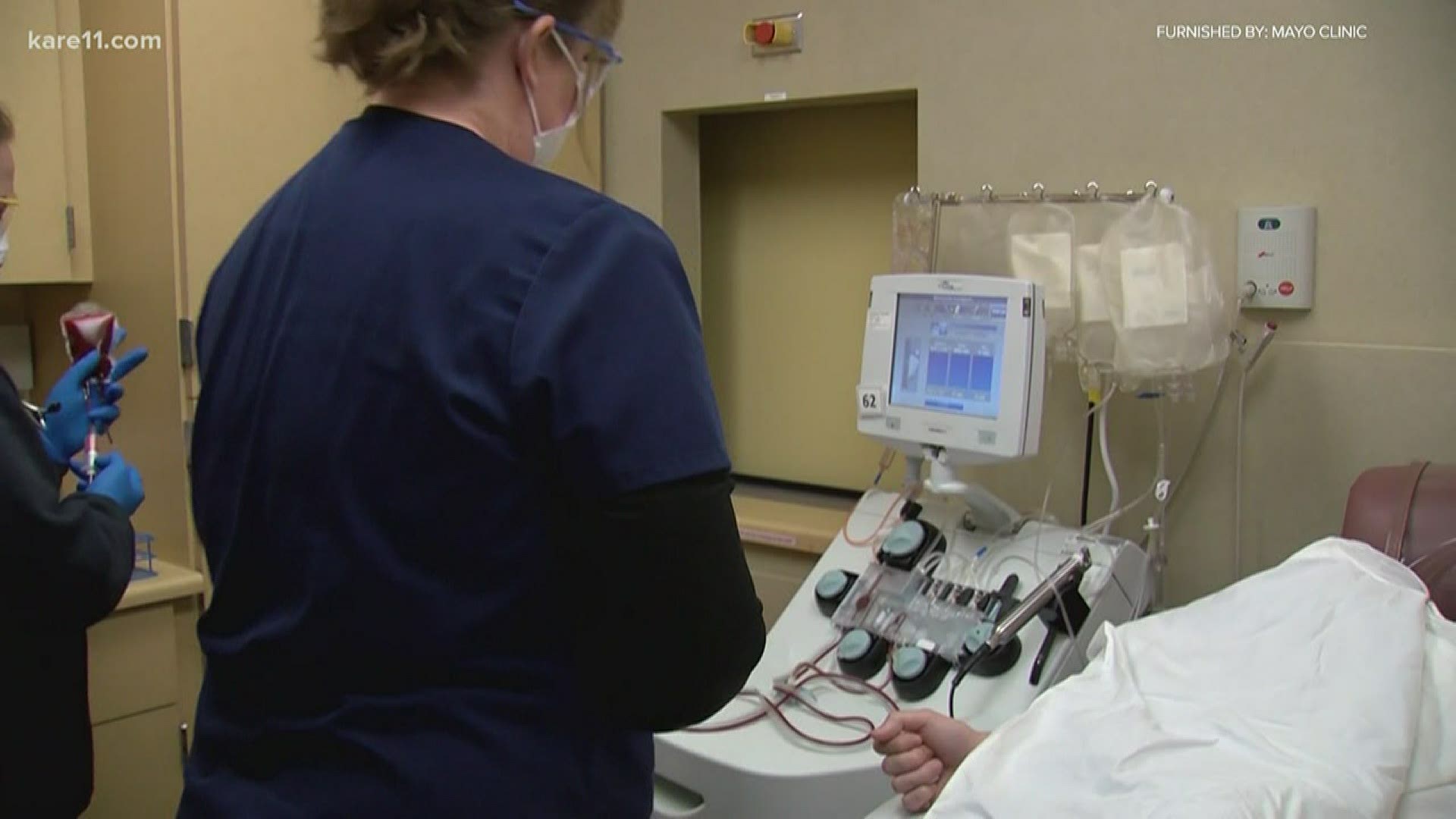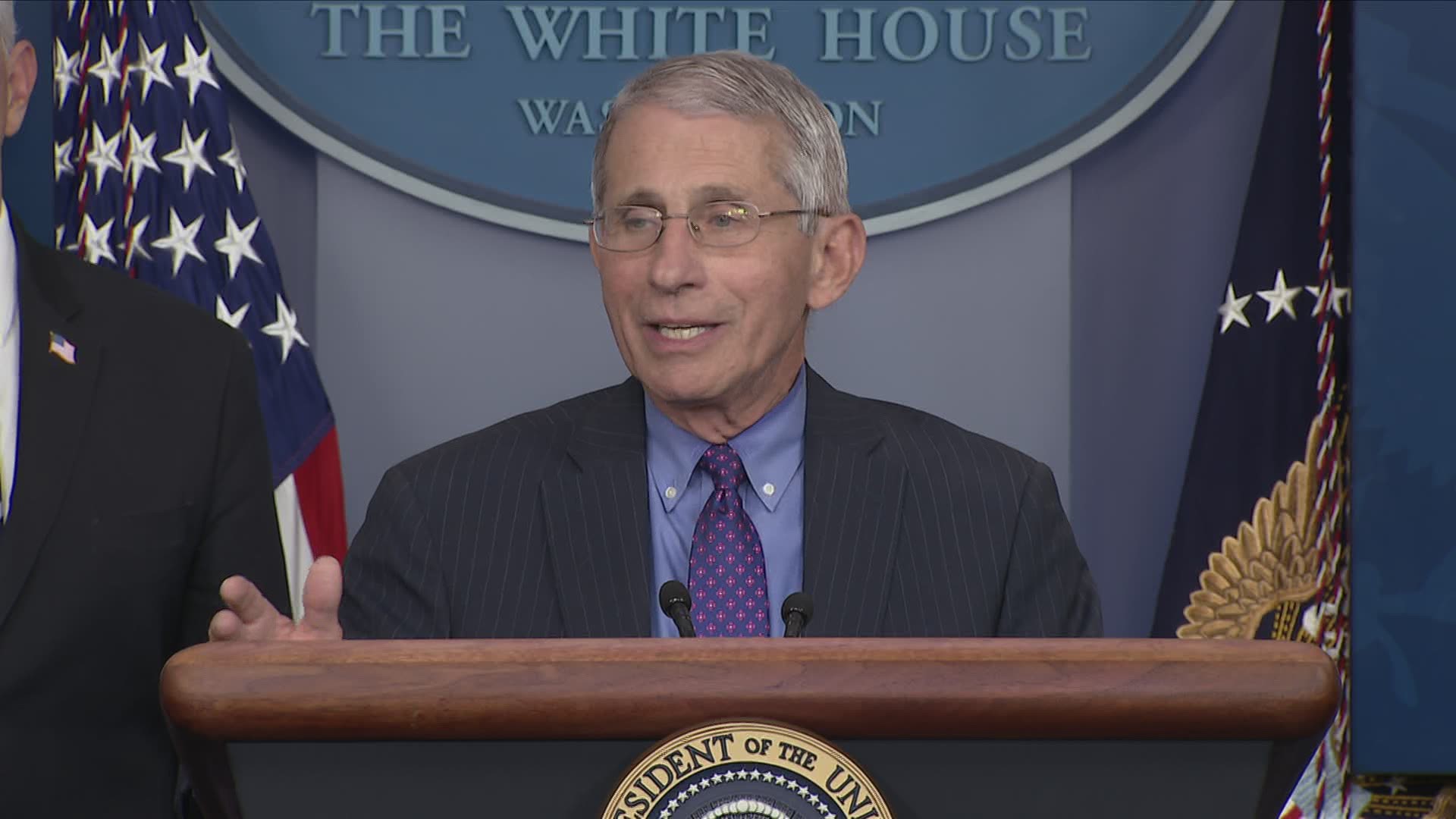MINNEAPOLIS, Minnesota — Mayo Clinic is leading a national plasma program to help treat COVID-19 patients. But more donations are needed from recovered COVID-19 patients as families wait for their loved ones to get this possible life-saving treatment.
On April 3, the U.S. Food and Drug Administration named Mayo Clinic as the national site for the Convalescent Plasma Expanded Access Program. The FDA anticipates through this effort they will be able to move thousands of units of plasma to patients who need it in the coming weeks.
Minnesota hospitals join study
About 40 sites in Minnesota have signed up to be a part of the study, as well as 38 physicians in the state. According to Mayo Clinic, as of noon on Thursday, six patients were enrolled in Minnesota to receive convalescent plasma therapy. Mayo did not know if any of these patients had actually received treatment yet.
North Memorial Health is part of the study and plans to enroll as many COVID-19 patients as they can. They currently have three signed up for the study.
"This is an opportunity to provide potentially beneficial care to a person with a COVID-19 infection and to gather data that will help us define what is helpful and what is not helpful in treating these patients," said Dr. Leslie Baken, an infectious disease specialist and the medical director of Infection Prevention and Antimicrobial Stewardship at North Memorial Health Hospital.
Patients who have recovered from the novel coronavirus that causes COVID-19 have antibodies in their blood that can fight the virus. A donor's plasma can then be transfused into a COVID-19 patient who does not have immunity yet.
"It's very early. Although the studies coming out of China and countries that have been affected before us are small studies, they look promising," Dr. Baken said.
It's also been used in the past including during the 1918 influenza pandemic. But with COVID-19, more data needs to be gathered which is why Dr. Baken said North Memorial Health is participating in the study.
A need for plasma donations
Dr. Baken said a barrier to providing this potential therapy is a lack of plasma donations from COVID-19 survivors.
For example, a Maple Grove couple was accepted into the study. Both tested positive for COVID-19. According to family members, their 85-year-old dad has been intubated and put on a ventilator. While they could receive this treatment, the couple's family said they are waiting on plasma donations.
Dr. Baken said they've had to look outside the state but they are beginning to receive plasma which will allow them to start treatment for those enrolled in the study.
"We have received plasma from the East Coast where COVID-19 has been affecting the population for many months now. They have more people who have recovered and are immune than we do here in the Midwest," Dr. Baken said. "Hopefully, as we gain more people in the Midwest who have recovered from this awful disease, we'll be able to offer them the opportunity to help others' recovery by donating their plasma."
In order to enroll in the study, Dr. Baken said patients must have a confirmed COVID-19 infection. They also have to have some symptoms of respiratory distress or concern about progression to severe disease based upon known risk factors for a severe COVID-19 infection.
Lack of testing
A lack of COVID-19 testing has caused roadblocks for recovered COVID-19 patients who want to donate. We've heard stories, including from patients in Minnesota, who want to donate but can't get a test to confirm their diagnosis.
Both Mayo Clinic and the University of Minnesota announced this week that they're ramping up COVID-19 testing.
"I think as soon as we have more capacity, you'll see the restrictions on testing loosening a bit and that will allow more people who want to give, to be able to give," Dr. Baken said.
How to donate
The American Red Cross is one of the organizations seeking people who have fully recovered from the novel coronavirus to sign up to donate plasma.
According to External Communications Manager Sue Thesenga, they have not collected any convalescent plasma in Minnesota yet but potential donors will be identified and screened in the coming days and weeks. The Red Cross said its biggest challenge is making people aware of how to register and getting them through the screening process.
Those who would like to donate must have a verified COVID-19 diagnosis, as well as be either symptom free for at least 28 days prior to donating or symptom free for at least 14 days prior to donating and have a negative COVID-19 test result.
Eligible donors who complete the online Donor Request Form will receive an appointment to donate convalescent plasma at a Red Cross or non-Red Cross collection site.
Thesenga said they hope to provide a response to the majority of potential donors in 3 to 5 business days.
Those who may be able to donate at Mayo can click, here, or contact convalescent.plasma@mayo.edu.
This blood bank locator can also help you find a donation site near you. Once you find a site, call ahead or visit their website.
KARE 11’s coverage of the coronavirus is rooted in Facts, not Fear. Visit kare11.com/coronavirus for comprehensive coverage, find out what you need to know about the Midwest specifically, learn more about the symptoms, and see what companies in Minnesota are hiring. Have a question? Text it to us at 763-797-7215. And get the latest coronavirus updates sent right to your inbox every morning. Subscribe to the KARE 11 Sunrise newsletter here. Help local families in need: www.kare11.com/give11.
The state of Minnesota has set up a hotline for general questions about coronavirus at 651-201-3920 or 1-800-657-3903, available 7 a.m. to 7 p.m.


